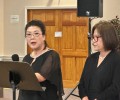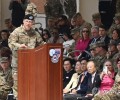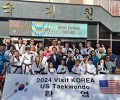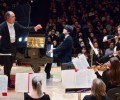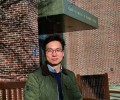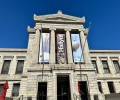| Antitank Squadron 2 |
| 보스톤코리아 2011-07-11, 15:47:27 |
|
By Tae-hyok Kim
We became apprehensive because the bridge was the only means for the refugees, soldiers and the vehicles to cross the river to the safety of south bank. Sgt. Park ordered us to go to the bridge anyway. The rain continued. As we approached the bridge, more refugees crowded the road. Vehicles were in disarray and did not move. I realized they were abandoned. I saw five or six army trucks with big guns were among them. The roads were completely clogged. Some of the refugees were returning from the bridge. Finally, we arrived at the bridge. The rain had stopped, and the day dawned with the cloudy. Thousands of distressed people including many soldiers and policemen stood on the riverbank and helplessly watched the destroyed bridge and the angry river. We joined them and silently surveyed the ugly wrecked bridge. The river was incredibly high and swift. It was too wide for anyone to swim across. Many trucks and buses were abandoned on the remaining part of the bridge. We heard some one saying that the bridge had been blown up without warning while many people and automobiles were crossing. Consequently, a large number of refugees and automobiles shared the fate of the bridge. At last Sgt. Park broke the silence by saying, “What shall we do? There is no way to cross the river, and the enemy will be attacking us soon. The river is too high and big to swim. I do not see any ferry either.” Someone said, “How about trying Kwangnaru Bridge?” The sergeant responded, “It is across the city, at least twelve kilometers northeast of us. Don’t you know that the enemy has already taken downtown? We’ll all be either killed or made prisoners of war even before reaching the bridge. That is out of question.” The silence descended upon us again. I was the only one among us who came from North Korea. If we were captured, the North Koreans would surely recognize me as a North Korean native because of my accent, and treat me more harshly than the others. I decided to cross the river by any means or to fight them to death, absolutely no way would I become their prisoner. I said, “Sergeant, we should return to the camp and set a defense position on the hill top behind the camp and fight. You don’t want to become these goddamn enemy’s prisoners. Do you?” Everyone responded in almost one voice, “Are you crazy? Nine of us fight the mighty North Korean tanks with these rifles?” while tapping their M1 rifles. “No way, we will go back to the camp. Somehow, we have to cross the river.” They were right. If we returned to the camp and fought the surging enemy, we would all be killed before firing a single bullet. I agreed with them because I didn’t want to die. I didn’t want the enemy to capture me either. We had to cross the river. But no one had any good idea. I knew there were three railroad bridges not too far down the river, because I had lived in this area before I joined the army. I intently looked down the river through fog and saw the blurred figure of the bridges. Hope surged in my heart, and excitedly I yelled, “Hey, Sgt. Park. See those railroad bridges. They look in a good condition. Let’s use them to cross the river.” He responded hesitantly, “A railroad bridge? No way, you can use it. Too dangerous!” All others agreed with him. I was furious at their cowardly response. I shouted, “You are all stupid and gutless. You are going to do nothing here but wait for the enemy and surrender to them? Absolutely no way will I become their prisoner! Goodbye!” I briskly walked in the direction of the railway bridges. The bridges were about 500 meters down the river. I reached the nearest bridge and looked all the way to the other end. Thank God, it was not destroyed. I cautiously stepped on one tie after another. I noticed that the other guys followed me, not too far behind. I arrived at the first pier of the bridge and looked down the river. The muddy river splashed against the pier and wet my legs. The water level almost reached the tracks; it was perhaps one foot below them. I continued on to the second pier. Then, suddenly my feet froze. An incredible fear gripped me. There, two big bundles of dark-brownish, oversized hotdogs were tied to the tracks, one on each track. Dynamite! I raised my hand to warn, but I couldn’t speak. My throat was too choked to yell. I couldn’t move. I heard footsteps and voices from behind. My throat relaxed. Then I shouted, “Don’t move! Dynamite!” For a few moments, no one moved. No one talked. Then Sgt. Park cautiously came by. He did a quick eye-inspection and murmured, “That is dynamite alright! I think there are more of these bundles ahead of us. Do you see the wires that connect the two bundles and lead over the bridge toward the other side?” I nodded without a word. He continued, “We can not keep standing here. We have to move on.” He hollered, “Hey, you guys. Dynamites here. Move carefully! Don’t step on it!” We all moved with extreme caution to avoid the dynamite and the cables. As we advanced, we saw more bundles, every thirty to forty feet apart. Before seeing the dynamite, the roaring river scared me. Now, the explosives frightened me so much that I became oblivious to the river. Suddenly, a horrible thought occurred: if some idiots detonated this dynamite without a warning, as was done to the Han River Bridge earlier in the morning, while we were crossing the bridge, we all would surely be blown up into thousands of pieces and fall in the river. Then, the angry river would carry the pieces into the Yellow Sea. No one would ever know what happened to us. I shuddered. I presumed all other guys had the same fear as I did. As I advanced farther, my skill walking on the rail ties improved rapidly, and I picked up speed. After a long, dangerous march, we finally reached the end of the bridge. We shouted for joy, “We made it, we made it!” Even the sky cleared and the sun smiled over us. We continued to move on, chatting loudly, for 200 feet or so, and found an ominous plunger by the tracks. We all halted and looked at it. The cables from the bridge were connected to the plunger. Its handle was all the way up, ready to detonate the dynamite. No one was posted to guard it. It was abandoned. If some idiot had been there and pushed the plunger, my fear could have been realized. I trembled. I exclaimed, “Thank God, they abandoned it. We are alive!” All others shouted as I did. Sgt. Park said, “Let’s get some rest.” We kept a respectful distance from the plunger and sat down on the track. He asked, “Shall we blow up the bridge or not? I do not know what to do.” Some of us opined to blow it up immediately so that the enemy could not cross the river; others said to keep it for some time so that our soldiers and refugees might use it as we did. While we were discussing what to do, three big American bombers flew over the bridges from the west one after another and dropped bombs. The bombs fell in two straight columns with huge hissing noise, like a storm. Within a few seconds, they exploded with ear-splitting booms. We all fell flat on the tracks, plugged our ears with our fingers and watched the spectacular explosions. Gigantic smoke mushroomed into the sky. The three bombers flew south. A few minutes later, three more came and dropped more bombs, producing another fantastic show. After the magnificent shows were over and the mushrooms dissipated, we rose and did a quick eye-inspection on the bridges. They were extensively damaged – many sections had fallen into the roaring river. The awesome destruction kept us mute for some time. Then Sgt. Park broke the silence and said, “Well, the bombers took care of the bridges. We don’t have to worry about the plunger. Let’s move to Anyang City, ten kilometers south of here. We might meet our friends.” We were hungry and tired, but had nothing to eat. We dragged our feet toward Anyang, not knowing when we might be returning to Seoul. While moving southward, we witnessed a few more bombers flying toward the bridges, and heard a series of loud booms. Thank God, the deputy commander didn’t issue an order, “Destroy enemy tanks!” We escaped capture or even death! ⓒ 보스톤코리아(http://www.bostonkorea.com), 무단전재 및 재배포 금지 |
 |
 의견목록 [의견수 : 0]
의견목록 [의견수 : 0]
|
 |
| 등록된 의견이 없습니다. | |
|
|
 프리미엄 광고
프리미엄 광고

161 Harvard Avenue, Suite 4D, Allston, MA 02134
Tel. 617-254-4654 | Fax. 617-254-4210 | Email. editor@bostonkorea.com
Copyright(C) 2006-2018 by BostonKorea.com All Rights Reserved.
Designed and Managed by Loopivot.com












